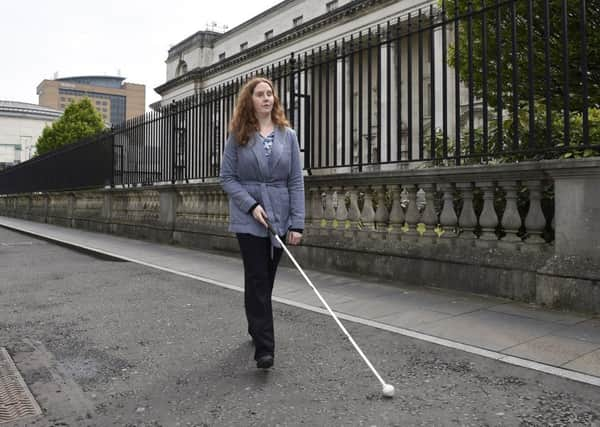Will council have to rip up £5m public realm scheme?


The £5million project, which was only completed in October 2015, may have to be amended after a High Court judge upheld a Lisburn woman’s legal challenge that the 30mm high kerbs used in the scheme are too low and pose a serious safety risk as guide dogs and long cane users may fail to detect the difference in surface levels.
Joanna Toner, who is blind, successfully argued that Lisburn and Castlereagh City Council failed to consider its Section 75 equality obligations, which required the council to consciously consider the needs of blind and partially sighted people when designing and implementing the public realm scheme.
Advertisement
Hide AdAdvertisement
Hide AdAs a result, the court quashed the council’s decision to allow 30mm high kerbs (half the recommended minimum height) in the scheme and ordered them to think again in light of the negative impact on blind and partially sighted people.


Mrs Toner, who campaigned against the lower kerb heights when the council was planning the public realm scheme, explained the difficulties she and other blind people have faced since the work was carried out.
“If you have a guide dog or a long cane it is impossible to tell when you are on the footpath or when you are on the road, so you don’t know when you’re safe and when you’re in danger,” she said.
“Many times I have been coming down the stretch past the church and going to cross over towards River Island and I’ve missed the paving and because there is no kerb I’ve just walked out across the road. There’ve been times I’ve got to the other side and just thought ‘oh my goodness, I’ve crossed the road again without even realising’. It’s very disconcerting and very dangerous.”
Advertisement
Hide AdAdvertisement
Hide AdHaving failed to convince the council not to use lower kerbs in the scheme, Mrs Toner instigated Judicial Review proceedings in 2014.


Giving his judgement at the High Court on Friday morning, Mr Justice Maguire said: “There is clear evidence that the blind or partially sighted as a group of disabled people were likely to be affected by the way the scheme was designed and built.”
Although the verdict does not mean pavements must be ripped up, the council is now expected to ensure the process is subjected to a full equality impact assessment.
Welcoming the judgement, Mrs Toner, who went blind when she was 15 years old, said: “I’m delighted we’ve gotten this decision. The council will now have to start the process again and, this time, take into consideration the needs of all disabled people. This has been a long battle and I’d like to thank the many people and organisations who have supported me, including RNIB NI and Guide Dogs NI.”
Advertisement
Hide AdAdvertisement
Hide AdThe self-employed yoga teacher, who lives in the Longstone Street area of the city with her husband Barry, who is also blind, added: “We now have the backing of TransportNI and others regarding the minimum kerb height requirement so I think it would be very difficult for the council to do anything other than make an amendment to the public realm scheme, but that’s something that’s further down the line.”


The Ulster Star asked the council if it was aware of Mrs Toner’s concerns prior to work starting on the public realm scheme. And, if so, why it had chosen not to use higher kerbs in the Market Square project.
We also asked the local authority what action, if any, it plans to take now to address the issues raised by RNIB and Guide Dogs NI following Friday’s judgement, specifically if it plans to revisit the public realm scheme at Market Square and raise the heights of the kerbs.
The council was also asked for clarification about the next phase of the public realm works - the £3.7m Lisburn Linkages project - and if it will comply with the requirement for 60mm kerb heights.
Advertisement
Hide AdAdvertisement
Hide AdDeclining to answer the questions posed by the Star, the council issued a statement, saying: “Following the publication of the Judicial Review judgment regarding the public realm scheme in Market Square, the council will now carefully consider the judgment and any next steps required.


“It would be premature for the council to make any statements that may be perceived as pre-empting such careful consideration. The council would however, wish to acknowledge the efforts and commitment of all parties involved in the Judicial Review and affirm its intention to follow up actions that may be required.”
Welcoming Friday’s “landmark judgement”, Guide Dogs NI and RNIB NI said the accessibility of public realm schemes in Northern Ireland and across the UK is an issue increasingly affecting blind and partially sighted people.
The charities have called on local councils to work with them and local residents who are blind and partially sighted to ensure town and city centres are accessible to all.